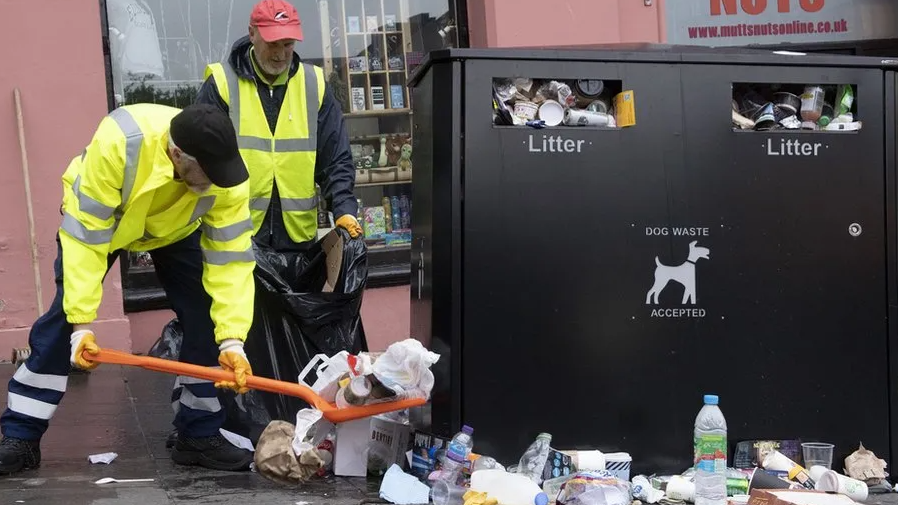Unions call off bin worker strike after new pay offer

- Published
Unions have suspended planned strike action by waste workers after a new pay offer from council leaders.
The proposed deal would see a 3.6% increase for all grades of staff, with a rise of £1,292 for the lowest paid, equivalent to 5.63%.
The Unite, GMB and Unison unions had taken the weekend to consider the proposal, which they will now put to their members.
However, the three unions are taking different views on the new offer. Unison says it will recommend that its members reject it, while Unite is urging acceptance and the GMB is making no recommendation.
Unions to decide whether to call off bin strike
- Published11 August 2024
New pay offer in hope of avoiding bin strikes
- Published9 August 2024
Staff in 26 of Scotland’s 32 council areas planned to walk out from 14 to 22 August after rejecting two previous wage increases proposed by local government body Cosla.
Unison Scotland's local government lead, David O'Connor, said the union believed the new offer was "still not enough".
He added: "Council staff have seen the value of their pay reduced by 25% over the past 14 years and any pay deal needs to do more to reverse this.
"The union has been clear all along that the wage deal needs to work for everyone in local government. This pause will provide some breathing space for further dialogue."
Graham McNab, Unite’s lead negotiator for local government, said members had "remained resolute" in an effort to secure a better pay offer.
He said: “We believe that the new pay offer is credible. For the first time in years, it will mean all council workers receiving an above inflation increase.
“Unite will now suspend the eight days of strike action so a ballot can take place on the new offer.”
GMB Scotland said the offer was "a significant improvement on what came before" but that it would be down to its members to decide if it was acceptable.
The union's senior organiser in public services, Keir Greenaway, said: "It is better than that offered to council staff in England and Wales, would mean every worker receives a rise higher than the Retail Price Index and, importantly, is weighted to ensure frontline workers gain most.
“As a gesture of goodwill, we will suspend action until our members can vote on the offer.
“It should never have got to this stage, however, and Scotland’s council leaders have again shown an absolute lack of urgency or sense of realism."
Tough choices
Cosla made the new offer on Friday after the Scottish government found more money to help councils pay for it.
The local government body's resources spokesperson Katie Hagmann said: "We are hopeful that this good offer, which is better than offers made to local government workers in the rest of the UK, will be accepted.
“We strongly urge all council employees who are eligible to vote to use this opportunity to accept the offer and secure a speedy settlement and pay uplift.”
First Minister John Swinney said funding the new offer would mean tough choices ahead for the government.
"We do not have any spare money sitting about. We will have to make reductions in other programmes to enable this offer to be made because things are so tight and so tough within the public finances," he said.
"We've identified some sources of the money but we've also got to find other resources to afford this particular offer.
"We do that because we want to protect communities but it will come with implications for the provision of Scottish government programmes and services."
The unions had previously been offered a 3.2% rise, backdated to April.
Two years ago a 12-day strike by refuse workers saw litter building up in the streets, particularly in Edinburgh where the city was hosting its summer festivals.
Public Health Scotland was forced to declare a health warning due to an accumulation of waste in urban areas.
The dispute was eventually resolved in early September, but only after an intervention from then-first minister Nicola Sturgeon.

The immediate threat of a bin strike is gone but the council pay dispute still is not over.
What happens now is in the hands of members of three main council unions.
It would be wrong to presume members will vote to accept the offer.
One union is recommending acceptance, another is recommending rejection and a third is making no recommendation.
One reason for Unison’s concern is that it feels more can be done to deal with what it sees as the long-term decline in the value of council pay.
But is a better deal possible or realistic this year? Cosla and the Scottish government argue the deal on offer was hard to fund and is at the limits of affordability.
However, the threat of joint action by all three unions had the effect of focusing minds in a way action by one alone may not have.
Now it’s over to union members.